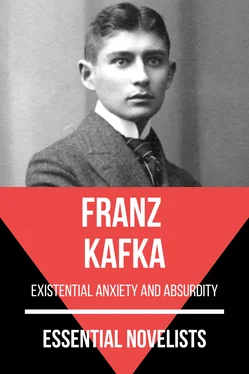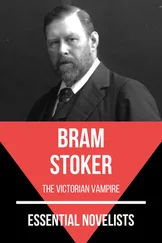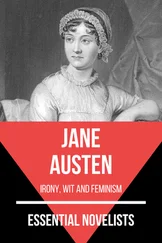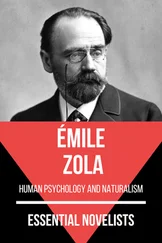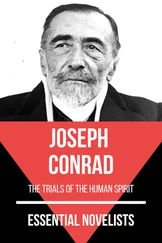August Nemo - Essential Novelists - Franz Kafka
Здесь есть возможность читать онлайн «August Nemo - Essential Novelists - Franz Kafka» — ознакомительный отрывок электронной книги совершенно бесплатно, а после прочтения отрывка купить полную версию. В некоторых случаях можно слушать аудио, скачать через торрент в формате fb2 и присутствует краткое содержание. Жанр: unrecognised, на английском языке. Описание произведения, (предисловие) а так же отзывы посетителей доступны на портале библиотеки ЛибКат.
- Название:Essential Novelists - Franz Kafka
- Автор:
- Жанр:
- Год:неизвестен
- ISBN:нет данных
- Рейтинг книги:5 / 5. Голосов: 1
-
Избранное:Добавить в избранное
- Отзывы:
-
Ваша оценка:
- 100
- 1
- 2
- 3
- 4
- 5
Essential Novelists - Franz Kafka: краткое содержание, описание и аннотация
Предлагаем к чтению аннотацию, описание, краткое содержание или предисловие (зависит от того, что написал сам автор книги «Essential Novelists - Franz Kafka»). Если вы не нашли необходимую информацию о книге — напишите в комментариях, мы постараемся отыскать её.
For this book, the literary critic August Nemo has chosen the two most important and meaningful novels of FranzKafkawhich areThe MetamorphosisandThe Trial.
Author Franz Kafka explored the human struggle for understanding and security in his novels such as Amerika, The Trial and The Castle.
Novels selected for this book:
–The Metamorphosis
–The Trial
This is one of many books in the seriesEssential Novelists. If you liked this book, look for the other titles in the series, we are sure you will like some of the authors.
Essential Novelists - Franz Kafka — читать онлайн ознакомительный отрывок
Ниже представлен текст книги, разбитый по страницам. Система сохранения места последней прочитанной страницы, позволяет с удобством читать онлайн бесплатно книгу «Essential Novelists - Franz Kafka», без необходимости каждый раз заново искать на чём Вы остановились. Поставьте закладку, и сможете в любой момент перейти на страницу, на которой закончили чтение.
Интервал:
Закладка:
They decided the best way to make use of that day was for relaxation and to go for a walk; not only had they earned a break from work but they were in serious need of it. So they sat at the table and wrote three letters of excusal, Mr. Samsa to his employers, Mrs. Samsa to her contractor and Grete to her principal. The cleaner came in while they were writing to tell them she was going, she'd finished her work for that morning. The three of them at first just nodded without looking up from what they were writing, and it was only when the cleaner still did not seem to want to leave that they looked up in irritation. "Well?", asked Mr. Samsa. The charwoman stood in the doorway with a smile on her face as if she had some tremendous good news to report, but would only do it if she was clearly asked to. The almost vertical little ostrich feather on her hat, which had been a source of irritation to Mr. Samsa all the time she had been working for them, swayed gently in all directions. "What is it you want then?", asked Mrs. Samsa, whom the cleaner had the most respect for. "Yes", she answered, and broke into a friendly laugh that made her unable to speak straight away, "well then, that thing in there, you needn't worry about how you're going to get rid of it. That's all been sorted out." Mrs. Samsa and Grete bent down over their letters as if intent on continuing with what they were writing; Mr. Samsa saw that the cleaner wanted to start describing everything in detail but, with outstretched hand, he made it quite clear that she was not to. So, as she was prevented from telling them all about it, she suddenly remembered what a hurry she was in and, clearly peeved, called out "Cheerio then, everyone", turned round sharply and left, slamming the door terribly as she went.
"Tonight she gets sacked", said Mr. Samsa, but he received no reply from either his wife or his daughter as the charwoman seemed to have destroyed the peace they had only just gained. They got up and went over to the window where they remained with their arms around each other. Mr. Samsa twisted round in his chair to look at them and sat there watching for a while. Then he called out: "Come here, then. Let's forget about all that old stuff, shall we. Come and give me a bit of attention". The two women immediately did as he said, hurrying over to him where they kissed him and hugged him and then they quickly finished their letters.
After that, the three of them left the flat together, which was something they had not done for months, and took the tram out to the open country outside the town. They had the tram, filled with warm sunshine, all to themselves. Leant back comfortably on their seats, they discussed their prospects and found that on closer examination they were not at all bad - until then they had never asked each other about their work but all three had jobs which were very good and held particularly good promise for the future. The greatest improvement for the time being, of course, would be achieved quite easily by moving house; what they needed now was a flat that was smaller and cheaper than the current one which had been chosen by Gregor, one that was in a better location and, most of all, more practical. All the time, Grete was becoming livelier. With all the worry they had been having of late her cheeks had become pale, but, while they were talking, Mr. and Mrs. Samsa were struck, almost simultaneously, with the thought of how their daughter was blossoming into a well built and beautiful young lady. They became quieter. Just from each other's glance and almost without knowing it they agreed that it would soon be time to find a good man for her. And, as if in confirmation of their new dreams and good intentions, as soon as they reached their destination Grete was the first to get up and stretch out her young body.
 |
 |

The Trial
Chapter One
Arrest Conversation with Mrs. Grubach - Then Miss Bürstner
––––––––
SOMEONE MUST HAVE BEEN telling lies about Josef K., he knew he had done nothing wrong but, one morning, he was arrested. Every day at eight in the morning he was brought his breakfast by Mrs. Grubach's cook - Mrs. Grubach was his landlady - but today she didn't come. That had never happened before. K. waited a little while, looked from his pillow at the old woman who lived opposite and who was watching him with an inquisitiveness quite unusual for her, and finally, both hungry and disconcerted, rang the bell. There was immediately a knock at the door and a man entered. He had never seen the man in this house before. He was slim but firmly built, his clothes were black and close-fitting, with many folds and pockets, buckles and buttons and a belt, all of which gave the impression of being very practical but without making it very clear what they were actually for. "Who are you?" asked K., sitting half upright in his bed. The man, however, ignored the question as if his arrival simply had to be accepted, and merely replied, "You rang?" "Anna should have brought me my breakfast," said K. He tried to work out who the man actually was, first in silence, just through observation and by thinking about it, but the man didn't stay still to be looked at for very long. Instead he went over to the door, opened it slightly, and said to someone who was clearly standing immediately behind it, "He wants Anna to bring him his breakfast." There was a little laughter in the neighbouring room, it was not clear from the sound of it whether there were several people laughing. The strange man could not have learned anything from it that he hadn't known already, but now he said to K., as if making his report "It is not possible." "It would be the first time that's happened," said K., as he jumped out of bed and quickly pulled on his trousers. "I want to see who that is in the next room, and why it is that Mrs. Grubach has let me be disturbed in this way." It immediately occurred to him that he needn't have said this out loud, and that he must to some extent have acknowledged their authority by doing so, but that didn't seem important to him at the time. That, at least, is how the stranger took it, as he said, "Don't you think you'd better stay where you are?" "I want neither to stay here nor to be spoken to by you until you've introduced yourself." "I meant it for your own good," said the stranger and opened the door, this time without being asked. The next room, which K. entered more slowly than he had intended, looked at first glance exactly the same as it had the previous evening. It was Mrs. Grubach's living room, over-filled with furniture, tablecloths, porcelain and photographs. Perhaps there was a little more space in there than usual today, but if so it was not immediately obvious, especially as the main difference was the presence of a man sitting by the open window with a book from which he now looked up. "You should have stayed in your room! Didn't Franz tell you?" "And what is it you want, then?" said K., looking back and forth between this new acquaintance and the one named Franz, who had remained in the doorway. Through the open window he noticed the old woman again, who had come close to the window opposite so that she could continue to see everything. She was showing an inquisitiveness that really made it seem like she was going senile. "I want to see Mrs. Grubach ...," said K., making a movement as if tearing himself away from the two men - even though they were standing well away from him - and wanted to go. "No," said the man at the window, who threw his book down on a coffee table and stood up. "You can't go away when you're under arrest." "That's how it seems," said K. "And why am I under arrest?" he then asked. "That's something we're not allowed to tell you. Go into your room and wait there. Proceedings are underway and you'll learn about everything all in good time. It's not really part of my job to be friendly towards you like this, but I hope no-one, apart from Franz, will hear about it, and he's been more friendly towards you than he should have been, under the rules, himself. If you carry on having as much good luck as you have been with your arresting officers then you can reckon on things going well with you." K. wanted to sit down, but then he saw that, apart from the chair by the window, there was nowhere anywhere in the room where he could sit. "You'll get the chance to see for yourself how true all this is," said Franz and both men then walked up to K. They were significantly bigger than him, especially the second man, who frequently slapped him on the shoulder. The two of them felt K.'s nightshirt, and said he would now have to wear one that was of much lower quality, but that they would keep the nightshirt along with his other underclothes and return them to him if his case turned out well. "It's better for you if you give us the things than if you leave them in the storeroom," they said. "Things have a tendency to go missing in the storeroom, and after a certain amount of time they sell things off, whether the case involved has come to an end or not. And cases like this can last a long time, especially the ones that have been coming up lately. They'd give you the money they got for them, but it wouldn't be very much as it's not what they're offered for them when they sell them that counts, it's how much they get slipped on the side, and things like that lose their value anyway when they get passed on from hand to hand, year after year." K. paid hardly any attention to what they were saying, he did not place much value on what he may have still possessed or on who decided what happened to them. It was much more important to him to get a clear understanding of his position, but he could not think clearly while these people were here, the second policeman's belly - and they could only be policemen - looked friendly enough, sticking out towards him, but when K. looked up and saw his dry, boney face it did not seem to fit with the body. His strong nose twisted to one side as if ignoring K. and sharing an understanding with the other policeman. What sort of people were these? What were they talking about? What office did they belong to? K. was living in a free country, after all, everywhere was at peace, all laws were decent and were upheld, who was it who dared accost him in his own home? He was always inclined to take life as lightly as he could, to cross bridges when he came to them, pay no heed for the future, even when everything seemed under threat. But here that did not seem the right thing to do. He could have taken it all as a joke, a big joke set up by his colleagues at the bank for some unknown reason, or also perhaps because today was his thirtieth birthday, it was all possible of course, maybe all he had to do was laugh in the policemen's face in some way and they would laugh with him, maybe they were tradesmen from the corner of the street, they looked like they might be - but he was nonetheless determined, ever since he first caught sight of the one called Franz, not to lose any slight advantage he might have had over these people. There was a very slight risk that people would later say he couldn't understand a joke, but - although he wasn't normally in the habit of learning from experience - he might also have had a few unimportant occasions in mind when, unlike his more cautious friends, he had acted with no thought at all for what might follow and had been made to suffer for it. He didn't want that to happen again, not this time at least; if they were play-acting he would act along with them.
Читать дальшеИнтервал:
Закладка:
Похожие книги на «Essential Novelists - Franz Kafka»
Представляем Вашему вниманию похожие книги на «Essential Novelists - Franz Kafka» списком для выбора. Мы отобрали схожую по названию и смыслу литературу в надежде предоставить читателям больше вариантов отыскать новые, интересные, ещё непрочитанные произведения.
Обсуждение, отзывы о книге «Essential Novelists - Franz Kafka» и просто собственные мнения читателей. Оставьте ваши комментарии, напишите, что Вы думаете о произведении, его смысле или главных героях. Укажите что конкретно понравилось, а что нет, и почему Вы так считаете.
